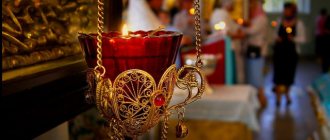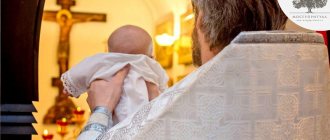Is it obligatory for a woman to cover her head with a scarf during home prayer?
It is clear that you need to wear a headscarf in church. What to do with the cell rule? In everyday life, not many women wear a headscarf, and even at home they pray without it. Of course, you should always pray anywhere, but in this case, should you wear a veil for prayer, or is it still possible to turn to God without a headdress?
Of course, it won’t be too bad if you pray at home without a headdress. However, the practice of piety in the Christian life has evolved over the centuries. However, women also wear the veil to pray at home. A girl, a girl, a virgin cannot wear a veil, but a married woman wears it. Maybe it will be different over time, but for now.
And if you go to work or to the store, or do any other activity without a head covering and read the Jesus Prayer, Our Father or the Virgin Mary, this is normal. But when you get up to pray at home, what’s stopping you from wearing a scarf? This will also help you. Prayer is even better and easier when you have a scarf on your head.
Can blessed scarves be washed?
Father, have a nice day, evening. When the relics of saints were brought to our city, I took with me the scarves attached to these shrines. Enough time has passed since then, the scarves are dirty. They can be washed, and if after washing they will receive the power given to them by the relics. Thank you.
Priest Igor Silchenkov answers:
Be healthy! Save me, God, I think grace is not washed away by detergents. As is faith. After all, these are spiritual concepts. And detergents are material objects. So if you need to do laundry, do it.
An archive of all questions can be found here. If you don't find the question you are interested in, you can always ask it on our website.
Is it necessary to cover a scarf when praying at home?
Marina asks: Good afternoon! Please tell me this is the first time I started fasting. And before the start of Lent, on Sunday I went to church for a service, where my father blessed all the parishioners for fasting. And many people asked him for permission to eat certain foods. The taorog also asked. And my father said that if you really can’t, then eat cottage cheese sometimes. Today is the third day, yesterday I ate a little grated pumpkin. Tell me, is this correct? And I sin so much, why do I do this?
or. Alessandro replies: Hi Marina! Fasting and prayer are our gifts to God, who instills in us the virtues of abstinence and standing before God. That is, fasting and prayer are the means, not the goal, of Lent.
And the means can be more or less powerful. You need to choose YOUR fasting measure so as not to break it. We can give up meat products - well, we can give up dairy products - even better, let's try to do without seafood - God help us. Seraphim of Sarov said that no one has yet died from bread and water.
Select the size you can take and the blessing will begin. The goal is our cleansing from sins in the Sacrament of Repentance and unity with Christ in Communion.
Costantino asks: How to fast on Wednesday and Friday? After all, fasting on Wednesday begins on Tuesdays and even Fridays, but from what hours to what hours? Thank you in advance.
or. Alessandro replies: Hello, Constantin. The ruling on food and the rite of worship are not the same thing. On Tuesday night you can still eat what you ate during the day. After 12 o'clock, when Wednesday comes, you no longer eat fast food. If you are asking to abstain from married life, then yes, the Church does not celebrate the sacrament of marriage until Wednesday (that is, Tuesday), until Friday (that is, until Thursday), as well as until Sunday and public holidays. And also on days of multi-day fasting.
Ekaterina asks: hello. Alexander, do I need to wear a veil when I pray at home? Also, what gifts to pay during Lent? Thank you.
or. Alessandro replies: Hello Catherine. You pray with a scarf in church, right? And at home you need to remain reverent during prayer and be sure to cover your head with a scarf. And bows to the land of Great Lent on Saturdays and Sundays are canceled.
Always be in the Mood
Column “School of Prayer”, issue 1
Educational talks are held in the parish of the Resurrection of Christ in the city of Nizhnekamsk. Students, together with the teacher, review the doctrine of prayer and together find answers to practical questions that arise for those who are learning to talk with God. Today we are starting a series of publications based on these conversations.
“You and I will little by little try to talk about how to pray.” Probably, if you think about it, you have a lot of questions about prayer. Or is everything clear?
- Which is understandable? We don't know anything.
- Well, let’s say someone is already going to study theology courses, there is some kind of basis. Someone has been praying according to the prayer book for a long time, right? In other words, you and I have some experience of prayer. But everyone probably felt that there were some difficulties. And praying can be difficult and sometimes incomprehensible. Let's outline the range of issues in general. Who remembers anything offhand, what problems there are, questions about prayer?
- Incomprehensible words.
- Yes, an incomprehensible language, indeed. Not modern...
— We don’t understand well what the prayers are about.
- Yes, there are such prayers. The great canon of Andrew of Crete is famous for this - it was written entirely on the basis of Sacred History, which you and I, unfortunately, know very little - that is, on the basis of the Old Testament. And if we just pray like that, we won’t understand a lot - we need to first study the Bible, and then we will understand better. Any other confusion?
— The question is simple and difficult. I pray at home - is it necessary to cover my head with a scarf?
“We asked this question to Father Alexander. Remember, it is written by the Apostle Paul...
- No, well, I got up at home in a dressing gown. Do I need to wear a dress? I can’t turn to the Lord God like that
- Well, you ended up in intensive care. There you are without any clothes at all. Covered with a sheet. Are you not going to pray?
- That's it!
- What if you’re washing in the shower, and a snake crawls in there, won’t you pray? He who is taught to pray will pray. Before you run away.
That is, how to separate it all? There are special cases. Let’s say you fall asleep and pray before going to bed. You don't have to sleep in a headscarf just for this. But at the same time, Father Alexander blesses, and most priests say that if you stand in front of an icon at home, light a candle, that is, go specifically to pray, wear a scarf, please.
And so you say, in a robe. In a good way, you need to dress nicely. Because at this moment God is looking at you. Of course, He looks mainly at the heart, your heart is important to Him, but if you dress correctly, you will pray differently.
Here are the men. We can walk around the house, although it's not very good, in some stretched out sweatpants.
— In summer, in shorts, for example.
- Exactly. Should we go to pray in the evening in shorts or in these pants? When you go to God, there is such a tradition of dressing beautifully. And in order for you to feel good, you need to get dressed. There is even such a practice - if you are depressed or have a very hard time in your life, then you can go to the cinema or drink tea with sweets, this helps. And here’s another piece of advice - go to the store, buy clothes that will make you feel good. Well, women know this, if you put on a new dress, your life will be easier. Sometimes you need to do these things to yourself. That is, clothes affect our internal state.
— What if it no longer has an effect? If clothes are in the background?
“God grant that everyone has it on second place.”
— If shopping is already stressful?
— I don’t encourage you to go to stores. By the way, John of Kronstadt said: don’t pay much attention to clothes. Think of it as the bandages with which fallen man is bandaged. There were no clothes in Paradise? And after the Fall, people became ashamed, and they began to cover themselves with leaves. And you don’t need to pay much attention to clothes.
And I talked a little about something else - the way we dress affects our inner state. Therefore, when praying, I advise you to dress normally, cover your head with a scarf and stand up.
To be continued…
Is it necessary to cover a scarf when praying at home?
About covering the head, or Is it obligatory for women to pray in a headscarf?
Nowadays, there is a pious tradition: in the temple, women cover their heads, and men take off their hats. How did this “recipe” come about? And does this mean that women should cover their heads when praying at home? Is it possible to come to church without a veil, but wearing a hat? Can girls go to church without hats? In this article we will look at how the tradition of headdresses began, what it meant to Christians in the first centuries, and how it relates to our time.
What does the apostle Paul say about covering the head?
There is an opinion among Christians that covering the head is one of the main requirements for a woman to appear in the temple.
This is confirmed by the words of the Apostle Paul’s first letter to the Corinthians:
And every wife who prays or prophesies with her head uncovered is ashamed of her head, because it is the same as if it were shaved. Because if the wife doesn’t want to cover herself, she cuts her hair; and if a wife is ashamed of having her hair cut or shaved, let her cover herself (1 Cor. 11:5-6).
In addition, the apostle reveals the significance of covering the head especially for women.
Firstly, the headdress is a symbol of the wife’s submission. Submission to whom? Before your husband and before God, just don’t take the word “submission” in the sense of family tyranny.
Just as Christ commands in the Church, so in a small church - a family - the husband rules. The husband's power is manifested in his care and responsibility for his wife and children.
Secondly, covering the head indicates the woman’s humility and chastity. To better understand the meaning of this statement, we need to turn to the historical realities in which the Apostle Paul wrote his appeal to the Corinthians.
Why didn't women melt and cut their hair in ancient times?
Imagine you are in 1st century Corinth. This is a rich Greek city with two ports, 700 thousand inhabitants, representatives of different cultures and religions. Many pagan temples were built in Corinth, one of the most famous is dedicated to the goddess of love and fertility, Aphrodite. Cult prostitution flourishes in this temple. Aphrodite's servants are easily distinguished by their shaved heads.
In addition, it is not only temple prostitution that is widespread in the city. It was easy to find prostitutes on the streets; they attracted the attention of men with their hair down and not hiding under a scarf.
For this reason, the Apostle Paul draws attention to women's headdress. If you don't want to look like a prostitute, wear a hat to avoid tempting a stranger. If you don't want to look like Aphrodite's servant, let your hair grow, because it is a woman's natural covering.
Is it possible for a woman to pray at home without a headscarf?
Olgo7 years agoReply
1 Cor. St. Apostle Paul chapter 11: 5 And every woman who prays or prophesies with her head uncovered disgraces her head, for it is as if she had been shaved; 6 For if a woman does not want to cover herself, then let her have her hair cut; and if it is a shame for a wife to be shorn or shaved, let her cover herself. 7 So the husband should not cover his head, because he is the image and glory of God; and the wife is the glory of the husband... 10 Therefore, a wife should have on her head a sign of authority over her, for the Angels... 13 Judge for yourself, is it proper for a wife to pray to God with her head uncovered? 14 Doesn’t nature itself teach you that if a husband grows hair, it is a disgrace to him, 15 but if a wife grows hair, it is an honor for her, since the hair was given to her as a covering? Interpretation of the bl. Theophylact of Bulgaria: “Isn’t it dishonorable for a husband to grow his hair, when through this he takes on the appearance of a woman and, appointed for dominance, takes on a sign of submission? But for a woman, letting her hair grow is an honor, because in this case she maintains her own rank, and maintaining her rank is an honor for everyone. Why do you need to put on another cover if your hair serves as a robe? In order to express one’s subordination not only by nature, but also by free will.”
…………..“If you, he says, do not pay attention to your husband, then be ashamed of the Angels” (St. John Chrysostom)………….. Interpretation of St. Theophan the Recluse: “For this reason, a wife should have power at the head, for Angel’s sake. “What for? - For all the reasons shown, and also for the sake of the Angel. If you, he says, do not pay attention to your husband, then be ashamed of the Angels” (St. Chrysostom). Have power on the head, that is, a sign of the husband’s power over her - a head veil. “The Apostle called the veil power, as if to say: let him show subordination by covering himself, and especially for the sake of the Angels who are assigned to people... Others refer to an angel for the sake of people, that is, to the heads of the Church, or the most honest of the Christians present in the Church[1 ]. But there is no need to deviate from the usual meaning of the word: Angel. What a thought: For the sake of an angel? Ashamed of them, or afraid of offending them. Just the thought of the invisible presence of Angels should calm you down and keep you in your rank. Personally, for the Angels themselves, whether the head is covered or not is equally indifferent; but with what intention and in what spirit it is done can either comfort them or offend them; and this is even more so if evil is not limited to one person openly holding the head, but spreads all around. The enemy sometimes, through one person, will harm hundreds. So, covering is a sign of submission and submission; it encourages one to look down, to humble oneself, and to observe virtue, for the virtue and honor of a subordinate consists in being obedient. The husband is not ordered to do this, for he is the image of the Lord Himself; and the wife is rightly prescribed" (Saint Chrysostom)"…………
“... a husband, he says, should not be covered, not only because he has Christ as his head, but also because he has power over his wife. When someone with power approaches the king, he must have on himself a sign of his power. Therefore, just as no one in power would dare to appear before someone clothed with a diadem without a belt and (appropriate to his rank) clothing, so you, without signs of your power, that is, without a naked head, do not pray to God, so as not to dishonor both yourself and who honored you. The same can be said about the wife: it is dishonorable for her not to have signs of her subordination. The wife is the glory of her husband. Therefore, the power of the husband (over the wife) is natural... So, the covering is a sign of submission and submission; it encourages one to look down, to humble oneself, and to practice virtue; the virtue and honor of a subordinate consists precisely in remaining in obedience. The husband is not prescribed to do this, since he is the image of the Lord himself; and the wife is justly (prescribed).” (St. John Chrysostom) [1] “Therefore, a wife should have honor on her head for the sake of the angels, that is, the priests, for although in some places she is forced to obey, everywhere, however, for the sake of the priesthood she is in obedience.” (St. Ephraim the Syrian) “Clement, the author of the book “Stromata,” quite subtly understood the righteous of the Church by angels. The wife, he says, must cover herself, so as not to tempt them into fornication.” (Blessed Theophylact of Bulgaria).
Is it necessary to cover a scarf when praying at home?
About covering the head, or Is it obligatory for women to pray in a headscarf?
Nowadays, there is a pious tradition: in the temple, women cover their heads, and men take off their hats. How did this “recipe” come about? And does this mean that women should cover their heads when praying at home? Is it possible to come to church without a veil, but wearing a hat? Can girls go to church without hats? In this article we will look at how the tradition of headdresses began, what it meant to Christians in the first centuries, and how it relates to our time.
What does the apostle Paul say about covering the head?
There is an opinion among Christians that covering the head is one of the main requirements for a woman to appear in the temple.
This is confirmed by the words of the Apostle Paul’s first letter to the Corinthians:
And every wife who prays or prophesies with her head uncovered is ashamed of her head, because it is the same as if it were shaved. Because if the wife doesn’t want to cover herself, she cuts her hair; and if a wife is ashamed of having her hair cut or shaved, let her cover herself (1 Cor. 11:5-6).
In addition, the apostle reveals the significance of covering the head especially for women.
Firstly, the headdress is a symbol of the wife’s submission. Submission to whom? Before your husband and before God, just don’t take the word “submission” in the sense of family tyranny.
Just as Christ commands in the Church, so in a small church - a family - the husband rules. The husband's power is manifested in his care and responsibility for his wife and children.
Secondly, covering the head indicates the woman’s humility and chastity. To better understand the meaning of this statement, we need to turn to the historical realities in which the Apostle Paul wrote his appeal to the Corinthians.
Why didn't women melt and cut their hair in ancient times?
Imagine you are in 1st century Corinth. This is a rich Greek city with two ports, 700 thousand inhabitants, representatives of different cultures and religions. Many pagan temples were built in Corinth, one of the most famous is dedicated to the goddess of love and fertility, Aphrodite. Cult prostitution flourishes in this temple. Aphrodite's servants are easily distinguished by their shaved heads.
In addition, it is not only temple prostitution that is widespread in the city. It was easy to find prostitutes on the streets; they attracted the attention of men with their hair down and not hiding under a scarf.
For this reason, the Apostle Paul draws attention to women's headdress. If you don't want to look like a prostitute, wear a hat to avoid tempting a stranger. If you don't want to look like Aphrodite's servant, let your hair grow, because it is a woman's natural covering.
So that no one doubts the purity and morality of the Christians of Corinth, the apostle advises women “who pray or prophesy” to cover their heads. This rule has been maintained in many churches to this day.
Should you pray with your head covered?
Telegram channel @ieshua.org
Shalom. How to explain to the evangelical brothers that praying in a kippah or a hat is not disgraceful? But I myself cannot understand why married women can pray without a headscarf? (Yehuda)
Answers Mikhail , rabbi of the Messianic community of Vinnitsa:
As I understand it, we find the basis for shaming a brother who prays with a kippah in the words of Rabbi Shaul, recorded in 1 Cor. Chapter 11
In general, what are we talking about there? About the details of clothing for prayer? If you look at how up. Paul refers to various rituals, one may wonder why it is important for him that a woman pray with her head covered. Maybe that's not what he's writing about? I see that Paul, using the example of clothing and hairstyles, is telling us about the correct position in the family for husband and wife.
The passage begins by explaining who is under what protection:
3 I also want you to know that the head of every husband is Christ, the head of every wife is her husband, and the head of Christ is God.
God determined for a man to be the head of the family or to be a covering for his wife, and gave the woman the role of a helper, i.e. to be covered by her husband. Apparently, in Corinth there were problems with understanding this issue. And here Shaul, using the example of covering the head, explains how in the spiritual world they look at a person who does not accept the covering determined by God. Or, instead of being this covering, it is covered itself. Let's read:
4 Every man who prays or prophesies with his head covered disgraces his head. 5 And every woman who prays or prophesies with her head uncovered disgraces her head, for it is as if she had been shaven.
In other words, it is a shame for a believing (praying) man if he avoids responsibility for his family and shifts it onto his wife, placing himself under her “cover.” Also, it is a shame for a woman who is disobedient to her husband, believing that after believing she does not need to take into account the opinion of her husband. She, in this case, prays with an “open head,” thereby shaming her.
Many women are proud of their “freedom”, expressed in disobedience and disobedience to their husband. There are such people among believers. But let's see what they look like from God's point of view:
6 For if a woman does not want to cover herself, then let her have her hair cut; and if a wife is ashamed to be shorn or shaved, let her cover herself.
In the spiritual world, a woman who does not accept her husband's covering looks as if she had shaved her head bald in the physical world. Let one of the sisters try to go out into the street, shaved her head, and see how passers-by will look at her. Surprise, bewilderment, in some cases, indignation and contempt - this will be the reaction of passers-by. The woman did something indecent and she was wrong. Society's attitude will quickly help her understand this. She will feel ashamed. This is exactly what a woman “uncovered” by her husband looks like to God and the angels. Therefore, in order not to be like one shaven before Him, it is necessary to “cover yourself.”
The following verses conclude the above:
7 Therefore a man should not cover his head, because he is the image and glory of God; and the wife is the glory of the husband. 8 For man is not from woman, but woman is from man; 9 And the man was not created for the wife, but the woman for the man. 10 Therefore a woman should have on her head [the sign of] authority [over] [her], for the sake of the Angels.
It is normal for a believing woman to wear a headscarf as a sign of her submission to her husband. It is also normal if she is “covered” by her husband and does not emphasize it outwardly. But it looks completely absurd if some sister is completely disobedient at home and at the same time wears a headscarf, fulfilling, as it were, the “commandment of the headscarf.” To paraphrase a well-known biblical phrase, I will say this: the Lord is not concerned about handkerchiefs in this passage of Scripture.
In conclusion, a few words about a man’s kippah and hat during prayer.
Yehuda, the question about yarmulkes has already been answered here on the portal. Let me just say that the kippah has never been considered a headdress. Simply, a sign of belonging to the Jewish people.
About the hat. In general, not taking off the hat during prayer in Orthodox Judaism was accepted because “not to be like Christians,” and I do not welcome such a motive. On the other hand, even in the epistle of Paul I do not see that it was fundamental for the apostle to remove his hat during prayer. Using the example of wearing or not wearing a headdress, he shows us something more important than scarves and hats. If a man takes care of his family and is responsible for it before God, he does the most important thing that he should do. And it doesn’t really matter whether this is emphasized by removing the cap during prayer or not.
However, one should not give cause for stumbling to those who, for various reasons, think otherwise. Therefore, a woman going to a meeting where it is customary to cover her head must cover her head. A man, being in a meeting where everyone is without hats, should also take off his hat.
Donate Last: 02/28. Thank you!
Subscribe: Telegram • Facebook • • • Twitter • Instagram • Youtube
More on the topic:
- How to treat the revelation about your wife (husband)?
- How to have a dialogue with God? (video)
- “About THIS”: How to determine a spouse from the Lord?
- Why doesn't God answer prayers for work?
Is it necessary to cover a scarf when praying at home?
About covering the head, or Is it obligatory for women to pray in a headscarf?
Nowadays, there is a pious tradition: in the temple, women cover their heads, and men take off their hats. How did this “recipe” come about? And does this mean that women should cover their heads when praying at home?
Is it possible to come to church without a veil, but wearing a hat? Can girls go to church without hats? In this article we will look at how the tradition of headdresses began, what it meant to Christians in the first centuries, and how it relates to our time.
What does the apostle Paul say about covering the head?
There is an opinion among Christians that covering the head is one of the main requirements for a woman to appear in the temple.
This is confirmed by the words of the Apostle Paul’s first letter to the Corinthians:
And every wife who prays or prophesies with her head uncovered is ashamed of her head, because it is the same as if it were shaved. Because if the wife doesn’t want to cover herself, she cuts her hair; and if a wife is ashamed of having her hair cut or shaved, let her cover herself (1 Cor. 11:5-6).
In addition, the apostle reveals the significance of covering the head especially for women.
Firstly, the headdress is a symbol of the wife’s submission. Submission to whom? Before your husband and before God, just don’t take the word “submission” in the sense of family tyranny.
Just as Christ commands in the Church, so in a small church - a family - the husband rules. The husband's power is manifested in his care and responsibility for his wife and children.
Secondly, covering the head indicates the woman’s humility and chastity. To better understand the meaning of this statement, we need to turn to the historical realities in which the Apostle Paul wrote his appeal to the Corinthians.
Why didn't women melt and cut their hair in ancient times?
Imagine you are in 1st century Corinth. This is a rich Greek city with two ports, 700 thousand inhabitants, representatives of different cultures and religions. Many pagan temples were built in Corinth, one of the most famous is dedicated to the goddess of love and fertility, Aphrodite. Cult prostitution flourishes in this temple. Aphrodite's servants are easily distinguished by their shaved heads.
In addition, it is not only temple prostitution that is widespread in the city. It was easy to find prostitutes on the streets; they attracted the attention of men with their hair down and not hiding under a scarf.
For this reason, the Apostle Paul draws attention to women's headdress. If you don't want to look like a prostitute, wear a hat to avoid tempting a stranger. If you don't want to look like Aphrodite's servant, let your hair grow, because it is a woman's natural covering.
So that no one doubts the purity and morality of the Christians of Corinth, the apostle advises women “who pray or prophesy” to cover their heads. This rule has been maintained in many churches to this day.











